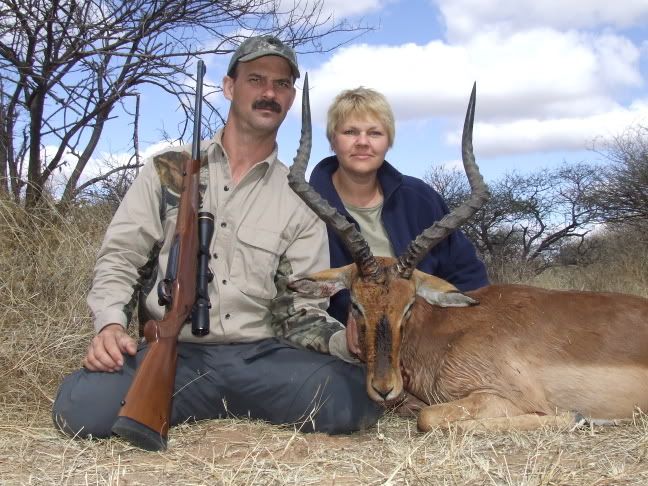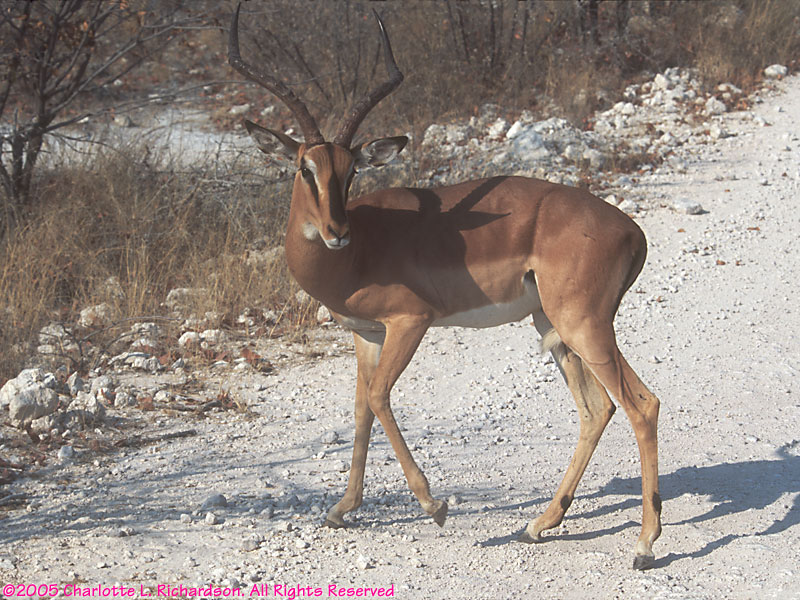The Accurate Reloading Forums
Black-Faced Impala in RSA?
22 February 2007, 02:17
Eland SlayerBlack-Faced Impala in RSA?
Just curious, does anybody have Black-Faced Impala in RSA?
22 February 2007, 02:53
kayakerIt would not surprise me if there were some transplants running about in SA (who knows?). Also be careful of 'back faced Impala' that aren't actually the subspecies, but just have a darker than usual blaze on their face. The
petersi subspecies has shorter horns (I think RW is 21") but is bigger in body.
However I am also sure that the trophy fee would be worth another whole bag of more common species.
From what I understand they are hellish expensive - this from Peter Flack's writings of some years ago (hunted in N Namibia)
22 February 2007, 03:14
Eland SlayerActually, they're not too bad in Namibia. We going to Namibia next year, and the last time I contacted our PH about Black-Faced Impala, he was charging $1,250 for them.
22 February 2007, 03:41
Die Ou JagterAlso, CITES and non importable to the states.
22 February 2007, 03:50
Eland Slayerquote:
Originally posted by Die Ou Jagter:
Also, CITES and non importable to the states.
Well, that's not ENTIRELY correct. If you go through
Conservation Force, it is possible to get them imported into the states.
22 February 2007, 04:56
Fulldraw Outdoor MediaI took this photo in the Limpopo region of RSA last year, near Thabazimbi. This ram had some Black Faced Impala characteristics that caught my eye. I wonder, if you took this ram or one like it, and imported back to the US if there would be any trouble?
Has anyone had trouble importing an impala ram from RSA with similar facial markings?
22 February 2007, 06:53
graybirdquote:
Originally posted by Eland Slayer:
Actually, they're not too bad in Namibia. We going to Namibia next year, and the last time I contacted our PH about Black-Faced Impala, he was charging $1,250 for them.
Then you add your $500 for the donation to the conservation fund equals $1750.
Although it would be an nice piece in the trophy room, I think I could find other 3 or 4 other species I would rather include for the same cost.
Don't get me wrong, I'd pull the trigger if my wallet was fat enough; unfortunately it isn't!
Good luck if you go after one!
Graybird
"Make no mistake, it's not revenge he's after ... it's the reckoning."
22 February 2007, 08:29
DoglegEland Slayer,
I shot this impala last year in RSA. It's a pretty ordinary impala with a bit of black blaze, but that made it a little different than my other one.I didn't know about the blaze when I pulled the trigger, bush hunting is like that. It cost me a whole $250 bucks.

22 February 2007, 19:42
Die Ou JagterEland, that sure isn't a contribution for tax purposes so don't hope to get by if audited. You are receiving services in exchange for the PAYMENT!
22 February 2007, 21:23
Aspen Hill AdventuresSome info from "Wild About You"

Average Mass:
65 kg (145 lb)
Average Shoulder Height:
90 cm (36")
Rowland Ward:
53.03 cm (20 7/8")
SCI:
50 Points
Distribution is Angola and Namibia.
The Black Faced Impala has distinct black markings on the face, tail, buttocks as well as patches of black hair above the ankles.
The impala is active throughout the 24-hour day, alternating resting and grazing, and drinking at least once a day. Herds have a home range of about 2-6 square kilometers. About 1/3 of adult males hold territories, which vary in size from 0.2-0.9 square kilometers. These territories are marked with urine and feces, and are defended against the intrusion of rival males. The owner of the territory attempts to control any female herds which wander into it. Prodigious leaps are the most well known feature of the impala's movement. Executed seemingly without effort, these jumps may span over 9 meters / 30 feet and may be 2.5 meters / 8 feet high - often over bushes and even other impala. Unlike many other plains grazers, the impala flees into dense vegetation rather than out into the open grassland. During the breeding season, males make a hoarse grunting sound.
Categorical-discrete (CD) distribution model
The species prefers edges between grassland and denser woodland, notably Acacia, it does not perform well in low nutrient status areas such as the Brachystegia woodland (Hirst, 1975; East, 1988, 1989, 1990; Jarman & Jarman, 1974).



~Ann

22 February 2007, 21:47
ROSCOEGood luck bringing them into the US...I had an impala taken out of my last trophy shipment because it had a dark stripe on the face. USFG said it was a black face impala and destroyed the trophy.
******************************************************************
R. Lee Ermey: "The deadliest weapon in the world is a Marine and his rifle."
******************************************************************
We're going to be "gifted" with a health care plan we are forced to purchase and fined if we don't, Which purportedly covers at least ten million more people, without adding a single new doctor, but provides for 16,000 new IRS agents, written by a committee whose chairman says he doesn't understand it, passed by a Congress that didn't read it but exempted themselves from it, and signed by a President, with funding administered by a treasury chief who didn't pay his taxes, for which we'll be taxed for four years before any benefits take effect, by a government which has already bankrupted Social Security and Medicare, all to be overseen by a surgeon general who is obese, and financed by a country that's broke!!!!! 'What the hell could possibly go wrong?'
22 February 2007, 22:00
7mm. guyOn my Safari to Namibia I couldn't shoot one of the rams we saw because it could have been mistaken for a black faced impala and therefore would not be legally importable. Just my 2 cents worth.
7mm. guy
shoot straight or shoot often.
23 February 2007, 04:16
Jorge400quote:
Originally posted by Eland Slayer:
quote:
Originally posted by Die Ou Jagter:
Also, CITES and non importable to the states.
Well, that's not ENTIRELY correct. If you go through
Conservation Force, it is possible to get them imported into the states.
Are you certain that Concervation Force can get them in to the US? I know they will go to bat for you. but how successful are they at getting black faced impala into the US?
I personally find the black faced impala one of the most beautiful animals. Under the right cercumstances, I do believe I would pay upwards of $1,750 (stated trophy fee and Conservation Force fee) for one.
"...Africa. I love it, and there is no reason for me to explore why. She affects some people that way, and those who feel as I do need no explanation." from The Last Safari
23 February 2007, 22:46
lengleng--"Good luck bringing them into the US...I had an impala taken out of my last trophy shipment because it had a dark stripe on the face. USFG said it was a black face impala and destroyed the trophy."
Are you kidding me? I am getting ready to ship my first african trophies back to the US very soon and my Impala had some black in its face. Does this mean I might not get it, they surely wouldent destroy something without talking to you right? Anything I should do up front to avoid any problems?
Thanks






